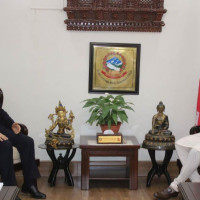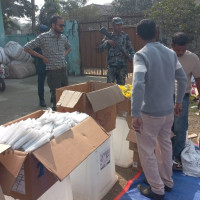- Thursday, 26 February 2026
Attitude Change Key To Consolidate Democracy
Attitude change refers to the process of shifting preexisting conduct, behaviour and understanding attuned to the modern times. It is the source of political confidence. Change enables us to acquire new vision, values, traits and beliefs which are better than the past, trustful and open to positive influence. Nepalis have witnessed a series of political changes in the constitutions, institutions, actors, issues and idioms of conversation. But these changes have hardly induced any tangible change in the cognition, attitude and orientation of the nation’s leaders towards consolidating democracy, development and social peace. This means there is virtually no change of its political culture helpful to the new orientation of science of politics.
One reason is the stabilisation of power by the incumbent through the equation of powerful actors, not the institutionalisation of values, procedures and laws giving sense to the political processes and lure the weak of society. The other is shifting coalition politics of government leaders of all ideological persuasions marked by their growing de-ideologisation with parallel effects on cadres and voters. The loss of ideology has propelled the birth of unbridled individualism in leadership and the perpetuation of superior rank over sovereign Nepalis. Rationalisation of this image by coterie of cronies, clients and inflated flattery of beneficiaries has reinforced this attitude. It has adverse effect on building solidarity and reducing the cost of political mobilisation.
De-alignment of second generation
Still the other is an upswing in the de-alignment of second generation of party leaders, cadres and voters causing fluidity of the political landscape and lack of robustness of democratic institutions to democratise attitude. One attitude change in Nepali political parties is clear: they no longer define each other in terms of class lenses of friend and foes. Most political parties have become homogenised, capable of joining both electoral and government coalitions irrespective of different historical identities and ideologies. Rational choice individualism dominates the political culture of Nepali leadership of both the left and the right.
Moreover, politics as usual has given continuity to the old political culture of negation and resistance against it through predictable mode of activism -- display of crowd, negative media posturing and accusation of each other for hoarding politics for profits. It is an inversion of civic culture of mutual accountability. The transformation in the political situation in the nation and historical experience has not initiated a matching attitude change of Nepali political classes. It has marked habitual and psychological persistence. Participatory democracy requires an attitude change. It blossoms in dialogue, negotiation and compromise of interests of all sides as per the goals of Nepali constitution.
The other element of change-averse attitude is seen in the emergence of political and economic monopoly, affecting public administration, leadership and political economy. It has fostered familistic and patron-client political patterns despite the struggle of leftist forces to create a new socialistic culture, NC’s social democratic society and conservative’s nationalistic one to emancipate politics from feudal privileges and impunity for the powerful. The sanity of Nepali cultural traits of tolerance of diversity is rendered less edifying. Rise of pre-political and post-modern groups’ proclivity to partial concerns hints at the decline of national perspective.
As a result, the public sphere of critical deliberation on policy issues and accountability is replaced by conformist way of life. Even the constitution of Nepal has adopted clustering of identities-oriented citizens rather than single meta-identity of Nepalis loyal to the state and upholding the virtue of civic patriotism. It denigrates socialistic and civic perspective and allows leadership to do nothing regarding social, economic and political backwardness. Now Nepali people are, by choice and compulsion, increasingly integrated in the tumult of global civilisations. Many of them are not unmindful of the roots of their own native soil.
One finds the continuity of the syndicate system in Nepal in the political economy. Democratic system and market economy embrace competitive spirits. Both seek to break monopoly of a class or supply chains. A system of syndicate fosters status quo and stifles the culture of attitude transformation to uplift the standards of living of ordinary Nepalis and uproot the causes of the nation’s inertia that is largely caused by ecological ruin, social fractures, economic predicament and lingering political instability. Its political instability is marked by high mobilization of anomic and disenfranchised forces and low ability of political system, political parties and civil society to infuse them. These trends have retarded the democratisation of internal political life of Nepali parties.
Party schools of almost all political parties are out of use thus hardly contributing to building democratic awareness, opinion, affinity and network for attitude change. As a result, one general pattern of Nepali voters and cadres is that they are leader-oriented, not party-oriented. This signifies weak political institutionalisation of Nepali parties and their frontal organisations. This has tuned policies to transactional course and increased its financial cost. Demand overload of Nepali polity is mounting: one group of people is asking for redistribution of power, position and wealth, the other is seeking recognition of its subsidiary identity and still the other is soliciting to overcome its marginalisation from the nation’s development process - revealing its Achilles heel.
The constitutional recognition of group rights for certain strata of Nepali population has eased power-sharing but its implications for micro-minorities are downbeat. So does the construction of national identity on the basis of demos as party membership or affiliation with non-government organisation is more rewarding than being a member of the state. It may be good for political entrepreneurs to widen societal cleavages and foment identity-based conflicts like those indoctrinated ones foment ideology-based conflicts, for the maintenance of old-style politics. How can multi-dimensionality of Nepalis be subordinated to mini-identities only without depriving the quality of nationality embedded in national citizenship and humanity entrenched in human rights?
It is, therefore, vital to know the basic power dynamics in operation in those identifications and those created by digital tribes between netizens and citizens. The distribution of positions of all public institutions among the party acolytes has made the Nepali state not a neutral, coherent and cohesive entity for national collective action in internal and international affairs but plurality of forms expressing different affiliation depending on whose party quota they represent thus enfeebling collective national strength. Collective action becomes difficult if there are fewer incentives, opportunities, stakes and shared interests for the top leadership to come together. Those working at the local levels with community forestry, irrigation, community schools and health centres, business chambers and labour unions are not the problem. But they are governed by sectional interest, not the general interests of all Nepalis.
The swing in the political equation without any purpose other than to protect each other’s interests has diluted the performance of the government, plunging development into a tortoise’s pace. If a leadership chases its own survival interests the pro-activeness of the public and national interests is snuffed out. It becomes a cause for the opposition parties, media and civil society to add oil to the fire of anguished people to struggle to make leaders accountable to their promise of rule by justice, not sheer power and legal logic. Theodor Adorno rightly says, “Negative dialectic is an inherently subversive element of reason and rationality.”
Politics does not work if reason becomes a slave of relentless passion of leaders without general civic purpose. It is essential to surpass the irrationality of passion of leaders to prevent them to use political power to manipulate the emotion, feeling and rage of people and twist laws and rules that govern institutional life of Nepalis. Such a tendency creates a tension between democratic imperative for legitimate order and people’s aspiration for meaningful freedom and a more comfortable life. Mere outmaneuvering of layers of opposition without worthy initiatives in matters of public goods does not set politics in balance. Seeking the consent of the ordinary Nepalis is important for securing legitimacy of the governance.
The Nepali constitution is crafted to meet a grand reconciliation of the state, polity, public institutions, private interests and people through the principles of freedom, law and justice. In this sense, a politics-free visualisation of the political economy is not suitable for its welfare state. What is incoherent in Nepal is the spirit of constitution and attitude of leaders to follow well-matched ecological, economic and social policies. The heartland Nepali elites are plagued by grand corruption, competition and inefficiency while the peripheral masses finding no option to survive are either looking for a vacuum cleaner to remove these vices or leaving their homes with old parents, children and wives to eke out their livelihoods abroad.
The desolation of rural areas has cut the burst of vitality and dynamism of rural Nepali youths who had once provided agriculture with great fillip and made Nepal a food surplus and food exporting nation. The challenge now is how to build a national political community which can flourish only with the mutual and reciprocal obligations and shared sacrifice from both sides — elites and the masses. The problem Nepal is facing is the decline of popular trust in public institutions for their lacklustre performance and increasing politicisation thus losing efficacy and integrity. This applies to the performance ability of Nepali political leaders as well. As a result, popular dissatisfaction is surging against the leaders, not the political system. This is not a cause of worry if leadership alters its attitudes as per constitutional spirit.
National unity
Nepali leadership has to organise the strategic goal of political socialisation where rival political forces can work together to compensate for each other’s deficiency and acquire social cohesion and national unity. Socialisation means learning to be rational and adopting national values and views by widening the perspectives and production. It infuses attitude change thus becoming more acceptable to others. It is the duty of public intellectuals, media and civil society to educate the Nepalis about their changing ties among themselves and with the institutions, political structures, leadership, system of rights and political economy and engage them in deliberation to shape public opinion and the legitimacy of collective action.
In Nepal, they are laying stress on the inclusionary mode of political deliberation and participation so that they have ownership in the means and ends of democracy. The other element in debate is reformist tools of constitutional amendment, balance of competing interests of political parties, social modernisation and control of anomic tendencies generated by a tension between human nature and human norms embedded in the constitution. Social media and independent researchers often highlight the widening of societal cleavages, not national unity essential for nation building. This kind of outlook and socialisation only question the authority and legitimacy of leadership and make them unmindful of the global audience. In this sense, attitude change matters for better governance adorned and esteemed by the Nepali public.
(Former Reader at the Department of Political Science, TU, Dahal writes on political and social issues.)





-square-thumb.jpg)





-original-thumb.jpg)




-original-thumb.jpg)